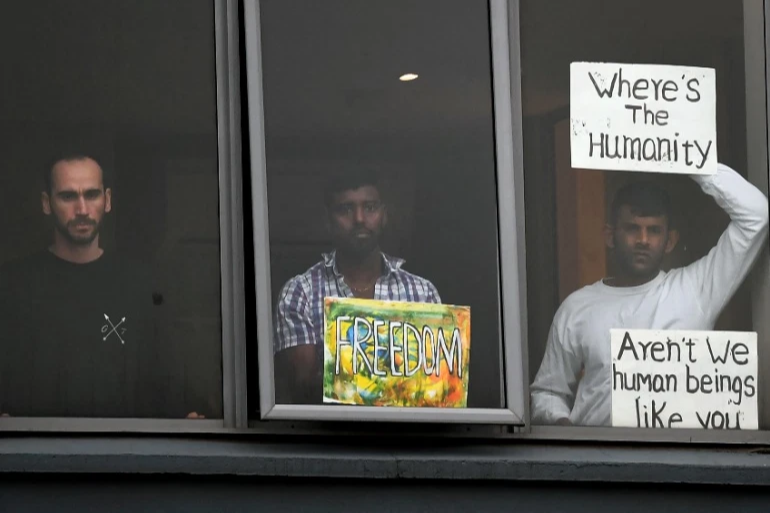
Three asylum seekers gesture to protesters holding a pro-refugee rights rally from their hotel room where they have been detained in Melbourne last year, after they were evacuated to Australia for medical reasons from offshore detention centres on Nauru and Manus Island [File: William West/AFP]
Melbourne, September 11 (RHC)-- Campaigners in Australia are urging the government to release asylum seekers held in immigration detention after at least one COVID-19 case was officially confirmed at a facility in Melbourne.
Melbourne, Australia’s second largest city, is currently in its sixth lockdown amid a coronavirus outbreak driven by the highly infectious Delta variant.
On Saturday, the whole state of Victoria reported 450 new cases. On Friday, at least 299 of the 334 cases reported were from Melbourne and surrounding areas.
Multiple campaigners and asylum seekers have told Al Jazeera at least two guards have tested positive and dozens more were presumed to be in quarantine because they had not reported for work in recent days.
The Australian Border Force (ABF), however, says only one staff member has been confirmed to have the disease. The individual is a contracted service provider at the Melbourne Immigration Transit Accommodation (MITA) Broadmeadows Residential Precinct (BRP), and “does not have contact with detainees as part of their role,” the ABF told Al Jazeera.
A MITA detainee, speaking to Al Jazeera on condition of anonymity, expressed fears for their health and safety, saying that as many as five people were living together in some rooms in the facility, which is divided into several different areas.
The units in the BRP, which have up to four bedrooms attached to a small kitchenette, are fairly spacious. By contrast the rooms in Avon, another compound, house up to six people on bunk beds.
He says while the ABF has provided detainees with masks and sanitiser, it has not carried out widespread testing for the virus. “They don’t test us for COVID unless we show symptoms,” the detainee said. “This means they would not actually know if it is spreading until a lot of people are sick. It could travel fast. Guards are free to come and go.”
The Border Force said the health and safety of detainees and staff was a priority and that it had worked with the state health department on “stringent” COVID-19 protection measures since the start of the pandemic. “It is untrue that infection prevention measures have been lax or minimal within immigration detention facilities,” the ABF said.
Prisons and detention centres around the world have become notorious as hotspots for COVID-19 infection with some countries releasing some of those held to reduce the risk of infection.
The Australian Human Rights Commission has described COVID-19 as a “serious threat” for the 1,492 people held in Australia’s immigration detention network. In a report in June, the commission said the government should place those who “present a low security risk in community-based alternatives to closed detention."
It also said authorities should improve physical distancing at the detention facilities and give special attention to the dozens identified as particularly vulnerable to the disease as a result of underlying health conditions.
Some 239 people are being held in MITA, in what campaigners have described as “crowded” conditions. The Commission added that many of the asylum seekers housed there have health issues,
A source inside the facility told Al Jazeera only half the people in his compound had received a first dose of a vaccine – all in the past week. There are about 60 people in his part of the facility, he said.
Sadaf Ismail, Detention Rights Advocacy Program Manager at the Asylum Seeker Resource Centre, who has clients inside MITA, says asylum seekers should be released immediately because social distancing was impossible inside the facility.
Detainees “are in close proximity with each other… how would it be possible for them to provide that isolation?” she said. Given the risks, the government must release all asylum seekers altogether, she added.

